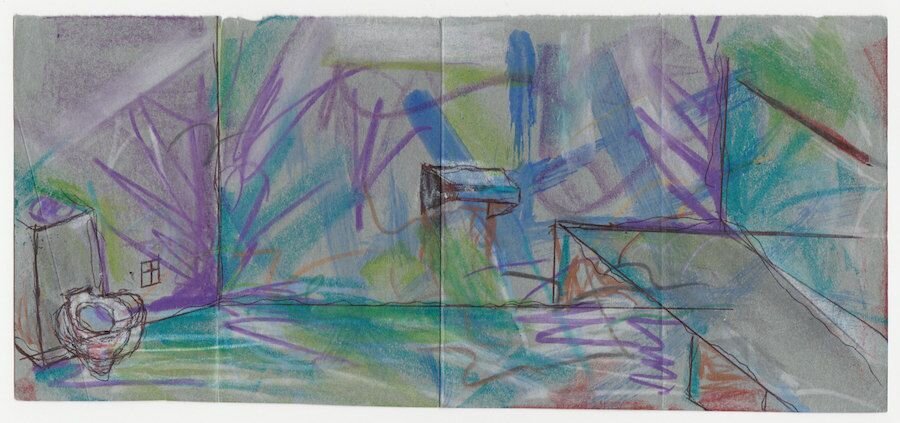“Although I may do my best to take advantage of the opportunities I have for genuine practice in the confines of this cell, to lose touch with what the cell is intended for would be a mistake.
It would also not serve my commitment to raising awareness on the inhumanity and destructiveness of the solitary cell. I’m committed to helping keep this conversation going till we see some change.”
Colors Carved from Concrete I, Moyo 2016
Reggie once told me that we could use these cells like meditation cells used by monks in monasteries.
But prison is not a monastery. And although I may do my best to take advantage of the opportunities I have for genuine practice in the confines of this cell, to lose touch with what the cell is intended for would be a mistake.
It would first be me not seeing things for what they are, which is something that my practice encourages me to do at all times: to see things correctly.
It would also not serve my commitment to raising awareness on the inhumanity and destructiveness of the solitary cell. I'm committed to helping keep this conversation going till we see some change.
And so, to not acknowledge this reality would be a betrayal to that driving motive – and to one of the very reasons that I have undertaken my own work toward healing.
***
Funny how the thing set to kill you is the thing you use to heal you. The solitary cell is the best sparring partner for the prisoner it holds. It is the best guru, the best teacher. Strange, I know, but it is true.
In this cell, I have learned the art of patience, the art of silence, and its fruits so sweet. I have learned the art of introspection and what it can do to improve one’s sense of self.
I have learned to wait this cell out with the patience it has enforced on me. I no longer scream out in agony in the grip of the cell’s silence.
I know that if someone came out of here after four decades, I should be doing fine in my decade and half. I’m just getting warmed up.
But so is this cell.
***
I don’t expect to ever be let out of solitary confinement alive.
I could die next year, I could die this year. I don’t sense an overwhelming anxiety about this.
What I am most concerned with is spending my time in worthy ways. What bothers me is that I am a waste to others while here. In the movie The Matrix, humans still served some purpose. They were fuel! Here, my purpose is none.
Stick me in front of a camera and let me talk to some at-risk kids. Teach me to knit so I can make some blankets for the homeless. Let me donate some blood or some organs!
I am a healthy male. When I am executed, I won’t be able to donate any of my organs because at that point they will be ruined by the chemicals that the state goes to all sorts of lengths to acquire to kill me and others.
So my protests are my donated organs.
My speaking out are my donated organs.
My art is my donated organs.
Colors Carved from Concrete II, Moyo 2016
SOLITARY CONFINEMENT is the practice of isolating prisoners in small cells for periods of time that range from days to decades.
It is a pressing human rights issue in the United States, where 80,000–100,000 incarcerated adults and children are held in isolation on any given day. Most death row prisoners are held in solitary, with little human contact or interaction; reduced or no natural light; and severe constraints on visitation, including never being able to touch their family or friends.
Solitary confinement causes devastating effects to the mind and the body. These include intense anxiety and severe depression, paranoia and hallucinations, rage and violent fantasies, self-mutilation, nightmares and insomnia, heart palpitations and lower levels of brain function.
Few prison systems use the term “solitary confinement” and refer instead to “segregation” or “restrictive housing”.
Those enduring these conditions describe it a living death.
In 2011, the UN Special Rapporteur on Torture and Cruel, Inhuman, and Degrading Treatment called on UN member nations to ban nearly all uses of solitary confinement in prisons, warning that it amounts to torture.
To learn more, visit:
Solitary Watch
American Civil Liberties Union: A Death Before Dying
Hell Is a Very Small Place - Voices from Solitary Confinement a book by Jean Casella, James Ridgeway and Sarah Shourd
The Guardian’s 6x9: A Virtual Experience of Solitary Confinement

